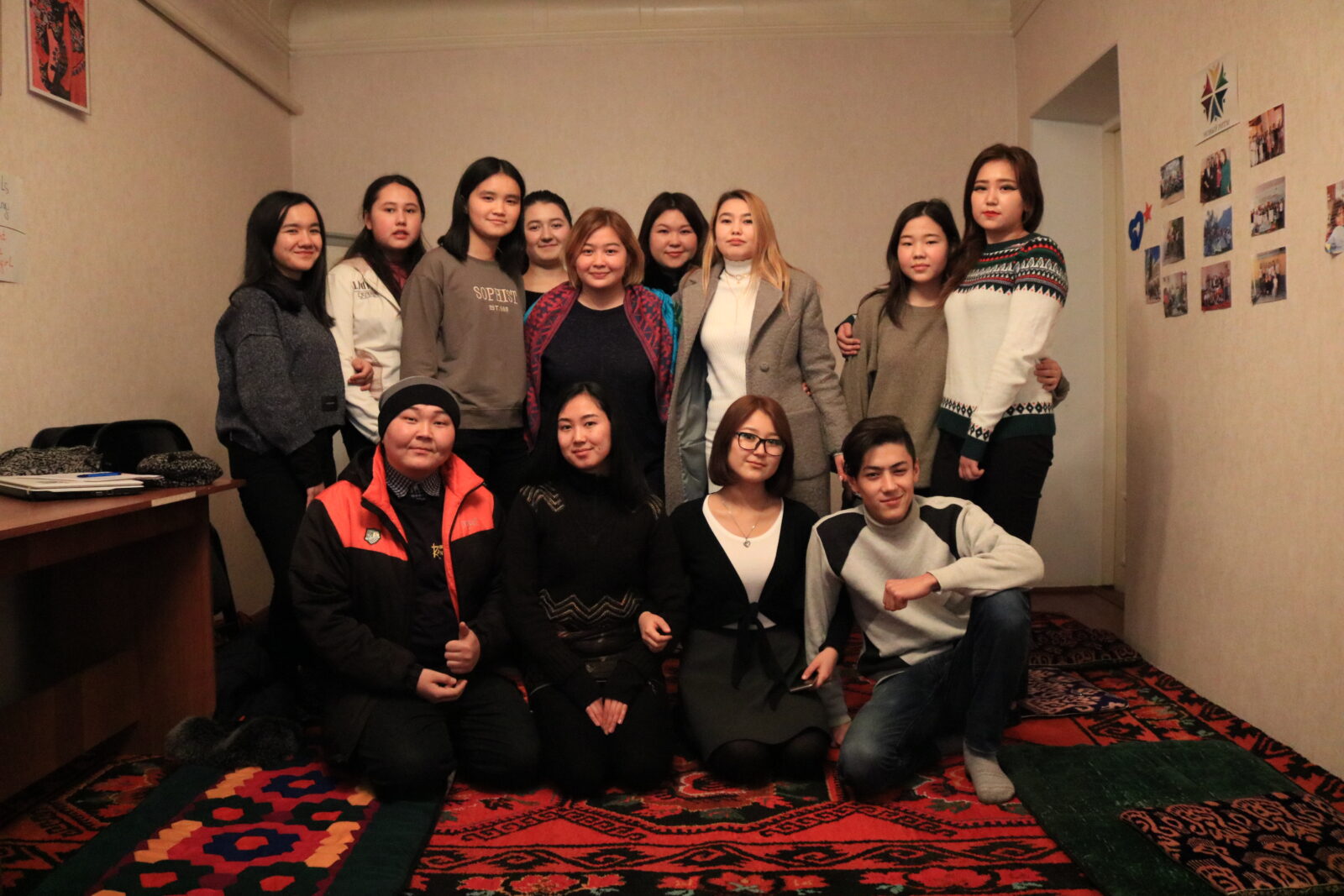Since 2014, a small feminist group called “New Rhythm” has been operating in Osh.
Young activists raise the issues of women’s rights and gender inequality in the southern regions of the country.
The Public Association “New Rhythm” (Kyrgyz “Жаңы толкун,” Russian “Новый ритм”) was founded four years ago in Osh, the southern capital of the Kyrgyz Republic. Initially, the group was not open to the public at all—it was simply four girls who got together and talked about topics that concerned them: women’s rights, violence against women, and gender inequality. Two years later, the young women decided to take public action, organizing a march on March 8, 2016 (International Women’s Day). Their first public campaign, it was designed to inform society about women’s rights and the problems facing women.


Aynagul Amatbekova and Saltanat Boronbayeva are two of the founding members of this small group of feminists. They began as volunteers and gradually took on positions of increasing responsibility in the organization, to the point that they now run the team. Both women were born in Osh and currently study International Relations at Osh State University.
the second-largest city in the Kyrgyz Republic
Osh, situated in the south of the Kyrgyz Republic, is an ancient city that dates back more than 3000 years. It is also part of the Ferghana Valley, where the borders of Kyrgyz Republic, Tajikistan and Uzbekistan intersect, and one of Central Asia’s most fertile regions. It is the second-largest city and the administrative capital of Osh province. The biggest ethnic minority, Uzbeks, comprises almost half of the city’s 250,000 population.



This group’s focus is unique, addressing topics that other organizations in this part of the country never discuss.
“We decided not to be afraid; we wanted to dig deeper and to raise actual problems. Perhaps not every organization would dare deal with those issues. We can see that gender inequality, conflicts and pressure exist in our society. We defined these as our current themes and decided to fight against them,” remembers Saltanat of the time when they launched “New Rhythm”.
The organization is mainly concerned with gender issues, particularly women’s rights. Aynagul and Saltanat think it is a little late to educate the older generation, hence their focus is on the younger generation, women aged between 14 and 28 years old. One of their main ideas is to fight against domestic violence, early marriage, and sexism, and to encourage women to pursue higher education.
“For instance, if a husband beats his wife, if girls are forbidden to obtain education only because they should get married as soon as possible in order to avoid undesired expenses, if girls are taught how to become housewives but are not taught important knowledge that is necessary to their future development—all of these issues worry and bother us. Unfortunately, we cannot do anything about the consequences of the problem. But we can prevent the problems by delivering education to the young girls, the next generation, who have not adopted the current system yet. Because they are open to education,” explains Saltanat.

Despite the obstacles they face on a daily basis, Saltanat remains optimistic about their work and envisions the society the group would like to see in the future.
“We want to see a society where each citizen’s rights are respected, regardless of that person’s gender and ethnicity, and where everyone is equal. We believe we will achieve that,” she says.
The group of feminists carry out different activities to address the issues they highlighted. One of the programs they organize is “Academy of Gender Norms” schools. Participants—mainly students and schoolchildren of both sexes—are selected via an online application process. One of the largest “academies” convened last year, bringing together more than 30 participants from different parts of the Kyrgyz Republic.
During the academy, the participants, among other things, stenciled designs onto the walls. The goal of these stencil designs was not only to tell the residents of Osh about women’s rights, but also to raise gender issues in society, such that the city’s inhabitants might rethink their perspectives. Participants drew images that reflected the stereotypes and gender-related issues they had experienced.
Feminism on the Walls

“With this picture, we wanted to show that women should be respected. They have the same interests as other people have: career, education, personal growth,” underlines Saltanat.
This Kyrgyz proverb cannot be literally translated into English, but it calls for respecting girls. It also mentions the 40 braids—a traditional attribute of unmarried girls in Kyrgyz society in the past. Each of the braids in the picture says something about the interests of women. Among them are not only family and children, which correspond to the traditional roles of women, but also career, education, hobbies, and friends. Activists believe that the proverb should inspire and support women.

Activists say that everyone should put the comma where they think it fits best.

Feminists in Osh believe that in the family and in society everyone should be equal, regardless of their gender.

This picture, according to the activists, shows the discrimination against young girls by older women in the family.

“Early marriage is considered to be one of the burning problems of the Kyrgyz Republic. People usually make their daughters marry at an early age due to societal pressure,” says Saltanat, explaining the picture’s message.
“If one guy hangs out with a lot of girls, it is considered to be fine. But when it comes to girls, it is considered a bad phenomenon,” the feminist indicates.

The activists raise questions about gender stereotypes concerning women and girls as well.

Saltanat says that the picture illustrates the pressure placed on a young daughter-in-law by her husband’s relatives.

The image shows the unequal treatment of children of different genders in traditional families. As the activists of “New Rhythm” state, this phenomenon applies to families who have only one son surrounded by sisters.
Bride Kidnapping and Violence: Women’s Rights in Kyrgyz Republic
According to the National Statistics Committee of Kyrgyz Republic, 2,555 incidences of violence against women—1,995 of whom were unemployed—were registered in the country between January and October 2015.
The Human Rights Watch report, which was published in October 2015, states that the courts often do not side with victims of domestic violence, and even if courts decide in the victim’s favor, the police do not systematically enforce protection orders.
In 2016, according to the UN’s common country assessment for the Kyrgyz Republic, 43 girls were kidnapped every day for marriage purposes; 35-45% of marriages in the country happened as a result of bride kidnapping. In the countryside, this figure can reach up to 60%.
“Currently around 10,000 women a year attend crisis centers for victims of domestic abuse, but there is still a large discrepancy with the thousands of cases informally reported,” reads the UN country assessment for the Kyrgyz Republic.
Three crisis centers are run in Osh, one in Batken, and one in Jalal-Abad.
















